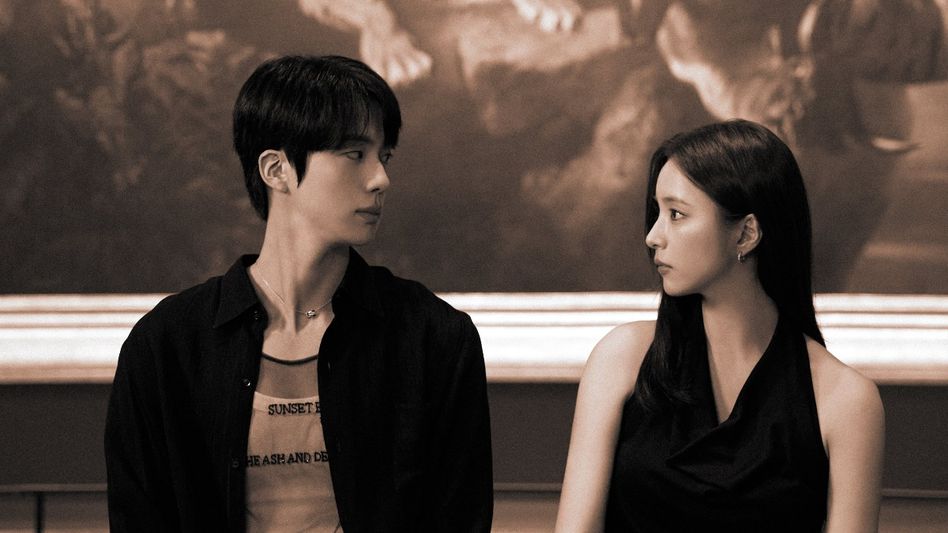BTS’s Jin opens wound with 'Don’t Say You Love Me': A sobering start to 'Echo'
Jin from BTS releases his second solo mini-album 'Echo' with seven emotionally rich tracks. The album highlights his growth and a more understated musical style
 Credit: BigHit Official
Credit: BigHit OfficialThere’s something unusual about the way Jin moves through his solo era — unhurried, understated, and never chasing reinvention. If anything, he seems to be shedding layers: scale, spectacle, certainty. What remains is something quieter. Something truer.
With the release of Echo, his second solo album, Jin isn’t trying to prove anything — he doesn’t need to. Instead, he offers a collection of songs steeped in memory, heartbreak, and emotional residue. It’s his most personal and musically restrained work to date.
The album’s seven tracks — “Don’t Say You Love Me,” “Nothing Without Your Love,” “Loser (feat. Yena),” “Rope It,” “Travel with the Clouds,” “Background,” and “To Me Today” — form a cohesive emotional arc. They dwell in the spaces between memory and detachment, intimacy and resignation, love and emotional exhaustion. There are dramatic key changes and soaring bridges, but the drama is as psychological as it is sonic.
The lead single: Asking for honesty, even if it hurts
And it begins with “Don’t Say You Love Me.”
On the surface, the song sounds like a breakup track. But it’s more complicated than that. It’s about the space between letting go and still being held — not by a person, but by the idea of them.
Jin’s lyrics are emotionally blunt. There’s no poetic metaphor, no cryptic imagery to decode. He’s tired. He’s trying to leave, and he keeps failing. The song reads like the last page of a love story that’s already ended — the kind of ending where no one slams doors, but nothing feels whole anymore. He knows it’s over, but he hasn’t yet learned how to behave like it is.
Lines about driving away, faking smiles, and asking a lover to lie instead of love — they aren’t about romantic drama. They’re about emotional exhaustion. They capture the strange way love can turn from safety to burden, and how hearing “I love you” at the wrong moment can feel like an emotional ambush. There’s no comfort left in the words, only weight.
Written with minimalistic precision, “Don’t Say You Love Me” strips heartbreak down to its most uncomfortable essence. This isn’t the high-drama anguish of torch songs, nor the self-pitying collapse of breakup anthems. Instead, Jin leans into numbness — the kind that lives in the quiet between decisions, where emotion has curdled into inertia.
The lyrics find him stuck in a loop: trying to leave, failing to detach, circling between resentment and helplessness. He doesn’t dramatise the pain; he just sits with it. One of the most disarming moments comes when he asks not for tenderness, but for clarity — “Just tell me that you wanna kill me” or “Lie to me, tell me that you hate me.”
These are the pleas of someone who would rather be hurt cleanly than dragged through uncertainty. If love has become indistinguishable from pain, then at least hate offers definition.
The production is equally restrained. There are no highs, no crescendos — just a slow, breathy build of soft synths and padded beats that never quite resolve. The song moves like fog, not fire. Every element is carefully held back, creating a sense of emotional claustrophobia. And Jin’s vocal delivery reflects that: he doesn’t belt, he doesn’t cry. He drifts. Most of the song lives just above a whisper, so when his voice does rise, it breaks the surface tension like a sudden gasp.
The overall effect is subtle, but powerful. It doesn’t try to overwhelm. It just sits with the listener, heavy, unresolved, and unflinchingly honest.
WATCH:
The Music Video: Memory as a landscape
The music video, shot across various locations in Singapore, adds a quiet, reflective layer to the song’s narrative, not by expanding on the lyrics, but by sitting calmly alongside them. Jin, dressed simply in loose, everyday clothes, inhabits spaces that feel frozen in time. He isn’t performing for the camera; he’s simply existing, observing, caught between memory and the present.
It opens with a tight close-up of Jin staring at a car pulling away. Inside sits a woman — later revealed to be actor Shin Sae Kyeong — her expression distant, not angry or tearful, just absent. This absence sets the tone for the entire video. There’s no confrontation or dramatised heartbreak here, just a quiet emptiness.
Jin moves through rooms with floor-to-ceiling windows that frame cotton-candy clouds and sterile skyscrapers outside. The colour palette leans heavily on pale blues and whites, evoking a mood of emotional repression rather than release. The room itself feels lived in yet empty, with scattered paintings and a photo in Jin’s hand acting as relics of a shared past — memories that remain tangible but unreachable.
Throughout, flashbacks punctuate his solitude. They show the two of them in playful moments and shared smiles — simple, fleeting warmth that contrasts sharply with the coldness of Jin’s current isolation. Even these glimpses of happiness are shot with a deliberate coolness, keeping the viewer at a respectful distance. It’s less about nostalgia and more about recognition: This is what we had. This is what we lost.
As the video progresses, Jin wanders alone through public and private spaces once filled with them — malls, museums, and an empty house. He is physically solitary but haunted by the lingering presence of their time together. The haunting isn’t supernatural, but deeply human: the painful familiarity of grieving someone who is still alive but no longer truly present.
The video closes where it began, with Jin and the woman sitting side by side in the car. They exchange a brief glance, then turn away, neither willing nor able to bridge the gap between them. No words are spoken, no resolutions offered. It’s an ending that feels perfectly unsatisfying, which is exactly why it works. The silence, the hesitation, and the unresolved tension mirror the song’s themes of emotional paralysis and incomplete goodbyes.
Where “Don’t Say You Love Me” leaves off, the rest of Echo picks up.
Listen: https://open.spotify.com/album/3DmDoHxAeEiDFNWrHSKAdQ?si=QL0Cf32OSRGVK7j5FsGqSw
“Nothing Without Your Love” softens the edges, but doesn’t offer resolution. It lingers on the fear of losing identity after losing connection. “Loser,” featuring Yena, brings a slightly more fun and upbeat energy compared to the melancholic lead single, injecting a playful edge into the mix. It’s arguably the most collaborative moment on an otherwise deeply personal record.
Then there’s “Rope It”, which literally opens with the sound of horse neighs, and “Travel with the Clouds” — tracks that stretch metaphor and mood, exploring escapism and emotional restraint. By the time the album lands on “Background” and “To Me Today,” Jin has stopped trying to make sense of anything. He’s observing, not resolving.
Together, these songs don’t build to a grand finale. They echo off each other, overlapping, some soft-spoken, some not soft-spoken, and open-ended.
The release of Echo isn’t the only milestone for Jin. He is also going on his first-ever solo tour — the #RUNSEOKJIN_EP.TOUR. Spanning nine cities across Asia, North America, and Europe, each stop will feature two consecutive nights of performances, giving fans time to settle into the experience. The tour kicks off June 28–29 in Goyang, South Korea, and will run through the summer and fall.
Copyright©2025 Living Media India Limited. For reprint rights: Syndications Today








